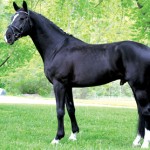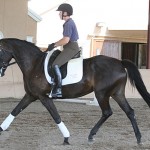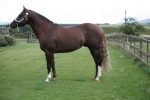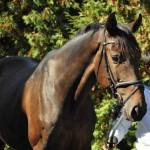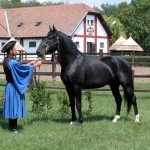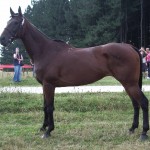Romanian Sporthorse
The Romanian Sporthorse, as the name suggests, is a breed of horse from Romania developed to provide an equine that excels in not just riding but other disciplines of equestrian sports. A closed stud book was formed with the registered animals as well as their offspring tracing back to the foundation bloodstock. Even though the breed type was kept pure, the population has slightly decreased.
Romanian Sporthorse Pictures
- Romanian Sporthorse Images
- Romanian Sporthorse Mare
- Romanian Sporthorse Pictures
- Romanian Sporthorse Stallion
- Romanian Sporthorse Stud
- Romanian Sporthorse
Quick Information
| Alternative Names | Romanian Warmblood |
| Temperament/Personality | Obedient, alert, elegant, social, easy to train |
| Physical Characteristics | Short, muscular, and somewhat square profile; small, concave heads similar to the Arabians; short, strong, thick, and well-developed neck; wide chests, powerful hips, straight croup; clean, long legs with wide, robust joints |
| Colors | Chestnut, gray, bay, and black; markings such as socks, blazes, and stripes are common |
| Height (size) | 16-17 hands (162-172 cm, 64-68 inches) |
| Weight | 1,157 lbs (525 kg) (average) |
| Common Uses | Riding, carriage, show jumping, dressage, three-day eventing |
| Health | A healthy breed with no known breed-specific equine diseases |
| Popular Traits | High strength and endurance, easily maintainable |
| Feeding/Diet | Hay, grass, grains, pellets, vitamins, mineral supplements, fresh water; apples, carrots, watermelon rinds, green beans, and celery could be given as treats |
| Country of Origin | Romania |
| Ancestors | Thoroughbred, Nonius, Furioso-North Star, Anglo-Arabian |
| Year/Time of Development | Mid-20th century |
Video: Romanian Sporthorse as a Show Horse
History and Development
This breed of warmblood horses originated in the mid-1900s when the criteria for their development were fully established. It was developed in 1962 at the Sâmbăta de Jos Stud while from 1970 at the Jegălia Stud. To increase the horse’s liveliness and improve its performance in competitions, the Romanian Sporthorse was subjected to a continuous refinement process through careful selective breeding works.
The breeding stock included Anglo-Arabian mares, horses from other breeds such as Nonius and Furioso-North Star, as well as Thoroughbred stallions, which were added to enhance the growth and agility of the offspring. Only those horses with the best qualities were selected for the breeding program. The breed is now being developed in isolation because the registry had been closed from the time when the last Thoroughbred called Finish was used.


